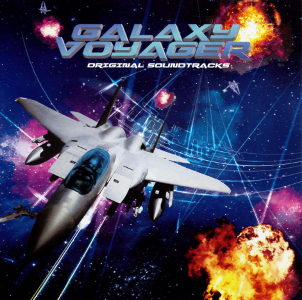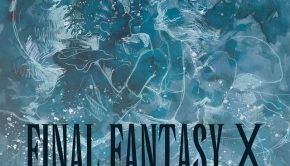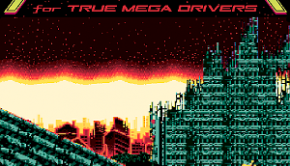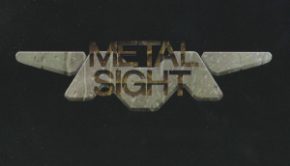Galaxy Voyager Original Soundtracks
 |
Album Title: Galaxy Voyager Original Soundtracks |
| Record Label: Virtual Video Game Music Project |
|
| Catalog No.: VVGSS3CD |
|
| Release Date: February 24, 2018 |
|
| Purchase: Buy Used Copy |
Overview
The Galaxy Voyager Original Soundtracks is an original album that is composed for a theoretical shoot ’em up game of the same name. Featuring a bevy of composers, all of which have composed for a shoot ’em up game in their career, the album chronicles the typical tunes you would hear in a shmup, from the character select music to various stage and boss themes, and of course, credits and sound effects. How does this album turn out with so many cooks in the kitchen and would someone not familiar with the shmup genre enjoy the music on the album?
Body
The album opens with Kenichiro Fukui’s, known for his work on Project Sylpheed, “Rapid Digital Rush (Opening),” with the first half being very fanfare-like while the second half features an exhilarating melody, energy, and tempo that helps complement the 80s soundscape it creates. “Ready for Interception (Configuration),” by Norio Nakagata, of Scorpius fame, changes things up a bit with its mechanical and cold beats, edgy sound fonts, guitar funk, and ethereal synths. It’s certainly a mish mash of sounds, but ends up being quite enjoyable. Manabu Namiki, known for many shmup soundtracks including Battle Garegga, contributes “Preparation (Preparation),” an extremely catchy synth tune with an upbeat and bright atmosphere with plenty of bass guitar as well.
Following the three non stage themes come the stage themes present on the album. The first, dedicated to Planet Terra, most similar to our Earth, is Hiroyuki Kawada’s, known for his work on Namco’s Star Luster, “Galaxy Voyager.” This titular theme opens with a fanfare intro, tying it in spirit to the opening theme, before moving towards a synth tune with a catchy melody accompanied by piano chords. The B section, in particular, is airy and bright and also boasts a beautiful melody. The first boss theme, “Rapid Digital Rush,” by WASi303, who has worked on the Psyvariar series, utilizes the same melody in the latter half of Fukui’s tune. Taking a synth rock approach, it gives off a nice retro feel and is quite invigorating and energetic. It does take a bit to get going, however, but is quite successful in the end. Soshi Hosoi, of Sonic Wings fame, contributes “Stage Clear,” a short fanfare that is nice for completion sake, but is essentially a minor contribution. Norio Nakagata also contributes a stage theme, in addition to the configuration theme. “Crimson Flame Planet” accompanying the theoretical Planet Flame stage features industrial tones, chaotic progressive rock inspired piano, rock tones, giving off a mechanical, atmospheric, and synthy feel to the piece. Much like his other contribution, it is certainly disjointed, but oddly hypnotizing. Planet Storm’s “Dancing with Storms,” by Hirofumi Murasaki, known for his work on JuJu Densetsu, provides plenty of funk, bass, and deep male choral tones, alongside wind sound effects, to create a tune that has a retro feel to it and a nice melody.
Grid Seeker’s Raiden Nakayama (alias of Norihiro Furukawa) continues with the music for Planet Aqua, “Cobalt Crusta.” Blending bright synths, rock elements, drums, along a smooth melody with a moody and tense atmosphere, the end result is extremely successful and manages to stand out. Toshiya Yamanaka’s, of Star Cruiser fame, “Let’s break through the forest obstacles,” the tune for Planet Plant, features funky slap bass alongside a smooth synth melody that really strikes a catchy note. Masahiko Ishida contributes two tunes to the album. The R-Type‘s veteran’s stage theme, for Planet Cell, is “Glowing Cells,” an ethereal piano and synthesizer tune with a trance backbone. It’s uplifting, sports a beautiful melody, and has a great progression. His boss tune, “You Will Be” is grungy, dirty, and drum n’ bass influenced, giving it a nice underground club sound. Industrial, intense, ethereal, with plenty of vocal sampling, it’s an excellent dynamic piece and serves as another of the highlights of the album. Motoaki Furukawa, known for his work on Gradius II, contributes “Cosmic Wonderland,” the bonus stage theme. Its bright and airy synthesizer complements the piano accompaniment quite well and the melody itself has a determined and fun sound to it. COSIO’s (alias of Hirokazu Koshio), known for his work on Dariusburst, music for Planet Ice, “Voices of Snow Crystal,” is a delicate piece featuring beautiful piano, crystalline synth, vocal samples for texture, and a subdued beat that really helps the melody shine.
Junya Nakano, who also contributed to Project Sylpheed, takes on the theme for Planet Darkness, “Sol Sistere.” Beautiful ethereal synths accompany a trance backbone, providing a wonderful atmosphere and an invigorating melody. One of the best tunes on the album belongs to TAMAYO, known for her work in the Ray series, e.g. Rayforce. Planet Ruins’ “Romance with Ancient View” features a dance beat, exotic vocal sampling and synthesizer, a fantastic retro melody, and plenty of jazzy piano hits. Keishi Yonao, of Strania -The Stella Machine– fame, provides his take on a tune for Planet Electric, “qE(r).” The tune itself gives off Strania vibe, particularly in the bass line, and the overall tune with its dance beats and synth melody is engaging and sports some jazzy tones as well. The last stage theme, “Stronghold,” accompanying the fortress stage, belongs to Daisuke Matsumoto, one of CAVE’s in-house composers, known for his works on PinkSweets and Muchi Muchi Pork. It is an upbeat and vibrant piece, reminiscent of his work for CAVE. The melody itself is quite memorable but the tone doesn’t really fit, at least in my imagination of what a final stage fortress would look like, and also comes off as a bit shallow. Tsukasa Masuko, who composed the music for Blazeon, contributes “Dimension,” the final boss theme. Unlike the other boss themes on the album, it’s more atmospheric and a bit less intimidating. Tension is still present and the synth/orchestral elements, alongside some rock ones as well, makes for a discordant piece that intensifies as it progresses. It’s not a bad theme, but certainly has an old school shmup mentality to its execution.
Hirofumi Murasaki also contributes the ending theme, “Silence in the air.” Featuring a pop inspired sound with a smooth accompaniment, this orchestral in nature tune boasting a synth melody is nice, but is certainly one of the more generic sounding pieces on the album. TECHNOuchi (alias of Yuji Takenouchi), of Space Manbow fame, adds “Engraved in History,” the ranking music. Militaristic tones, ethereal synths, a victorious atmosphere, with a touch of orchestral is an atmospheric piece that works as you enter your name onto the scoreboard. Motoaki Furukawa’s “Goodbye Galaxy” is the short game over theme that, much like the stage clear theme, is provided for completionist purposes. Go Sato, of Raiden series fame, provides the “S.E. Collection,” which, unlike most shmup soundtracks, plays over music. Lastly, TECHNOuchi provides a bonus track, “Little Wave,” originally from Bosconian, and arranged into an upbeat and vibrant tune with a synth base and retaining the retro feel of the original.
Summary
There are certainly a lot of watchful eyes that contributed to this amalgamation of iconic shmup composers. However, given that each stage theme typically has a unique theme, the fact there is little stylistic cohesion matters not. Most of the tunes fit very well with the aesthetic given their planet while only a few tunes come up short. Sold only at the Tokyo Game Music Show 2018 this past February, it might be hard to find a copy for purchase, but if you are lucky, it’s certainly worth picking up for a nice reunion, so to speak, of many classic arcade composers joining forces to create this soundtrack to an imaginary game. It certainly has me excited for their plans for next year, which include a sequel to their imaginary Mystic Ninja album, titled Return of Mystic Ninja, focusing on ninja action game aesthetics, and Demon’s Blood, a soundtrack to an imaginary gothic horror side scroller action game, both of which feature composers from this album and even some new ones.
Do you agree with the review and score? Let us know in the comments below!
4
Posted on May 10, 2018 by Don Kotowski. Last modified on May 10, 2018.














